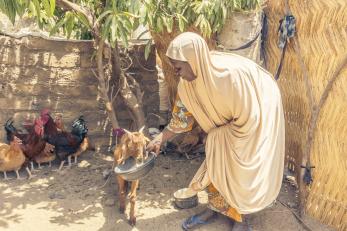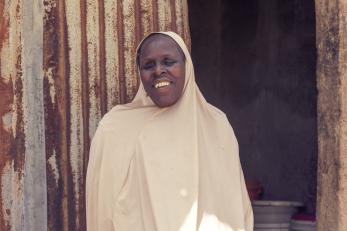Finding ability in disability: Conflict affected family empowered to conquer the past

For persons living with disabilities meeting their daily needs is an uphill task as they have to deal with barriers such as stigma, discrimination and violence. This makes living harder for them.
It was Charles Darwin that stated in his 1969 book ’On the Origin of Species’, that "organisms best adapted to their environment are the most successful in surviving and reproducing," popularizing the phrase ‘survival of the fittest’.
One can only then imagine how difficult survival has been for 45-year-old Karu Bulama, whom a measles attack left partially blind at an early age, and her husband, who, in a cruel twist of fate, suffered blindness in one eye after a local treatment for a viral infection. Their conditions, coupled with the hardship brought about by the insurgency in northeast Nigeria, have made survival difficult - not being in the category of ‘the fittest’.
"We have not always lived in Damboa Town," Karu said while narrating her story. She had lived happily with her husband in Sandiya village, Damboa Local Government Area (LGA). "We had a farm from which we took care of ourselves and our children," she continued.
Incessant attacks from non-state armed groups (NASGs) caused them to flee and settle in Damboa town. "Settling in Damboa was the most difficult period of our lives. We were homeless and resorted to begging for food," an emotional Karu narrated. Karu and her family experienced unprecedented suffering and uncertainty after being displaced from their community, living with disability, and losing their livelihoods.
As the saying goes, ’it will not always be night forever’. Things began to change for the better when she was selected as part of 1210 participants to receive support from Mercy Corps under the USAID-funded Addressing Diverse and Acute Primary Threats II (ADAPT II) program. To meet her immediate food needs, she was enrolled in the food assistance program and has been receiving monthly food supplies for the past nine months.
"Since we started receiving this support, life has become much easier, and we have been able to rent an apartment to live in," Karu said.

She also was given ten five-week-old Noiler poultry birds, along with a bag of starter mash, layer mash, a feeder, and a drinker. Karu was also trained on poultry management along with the rest of the participants. Also, she was given seeds and trained on how to establish and maintain a kitchen garden where she plants carrots and other vegetables for use.
Reflecting on the training she received, Karu shared that it was very helpful and provided her with the necessary knowledge and skills to manage her poultry birds effectively. She learned how to provide them with adequate nutrition, housing, and disease management, which helped her to rear healthy birds that grew quickly and produced a good yield.
With the support of Mercy Corps, Karu Bulama was able to successfully rear the birds. She sold some and made a profit of 24,000 naira. With this money, she was able to purchase 2 goats and reconnect with her earlier passion of rearing ruminants. When quizzed on why she opted to buy goats instead of continuing with poultry production, an excited Karu said, "Even though I received training on how to keep these birds, my condition makes it difficult, so I want to invest in goats seeing as they do not require as much care as the birds".
"Words cannot express my gratitude to Mercy Corps for putting a smile back on my face," Karu said. "Thanks to this support, I was able to revive my dream of rearing ruminants, and I will forever remain grateful, and even if Mercy Corps leaves Damboa today, I know I would be able to continue on this upward trajectory with my life."
Karu's success story is just one of many that show the impact of Mercy Corps' work in supporting communities affected by conflict. Through initiatives like the ADAPT II program, Mercy Corps is helping people like Karu to rebuild their livelihoods, regain their independence, and create a brighter future for themselves and their families.
About the Addressing Diverse and Acute Primary Threats II program
The goal of the ADAPT II program is to save lives and prevent human suffering among displaced, returnee, and host households in Borno State. The goal aligns with BHA’s overarching mission statement to "save lives, alleviate human suffering, and reduce the physical, social, and economic impact of rapid and slow-onset disasters." The scope of the program is also in alignment with the 2021 humanitarian response plan’s strategic objectives: to "improve IDP camp conditions and services, alleviate acute food insecurity and related severe vulnerabilities, strengthen self-reliant livelihoods for IDPs, control and prevent communicable disease outbreaks, and achieve alternative and durable solutions as opportunities allow."